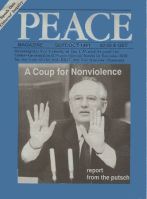
Peace Magazine Sep-Oct 1991, page 28. Some rights reserved.
Search for other articles by Isabelle George here
by Jane Boulden. Canadian Institute of International Affairs, Toronto, Summer 1991, 17 pages. Reviewed by Isabelle George
In November 1990 Joe Clark, then Minister of External Affairs, said: "Peacekeeping has a new role in the new notion of security. Peacekeeping in the future must anticipate as well as react. It must deal with the causes of conflict and not just their symptoms. It must build peace and not simply keep it."
Boulden uses this quote to begin her examination of peacekeeping by the United Nations-what it has been, and what it could be.
She reviews the provisions in the U.N. Charter giving the Security Council the right to enforce its decisions; she looks at the history and types of peacekeeping engaged in by U.N. forces prior to and including the war in the Persian Gulf; finally, she offers suggestions for future directions in peacekeeping by the U.N.
For interstate conflicts Boulden suggests that a state, perceiving a threat, could request that a U.N. peacekeeping force be deployed along its side of the disputed border. This could prevent conflict and would be especially beneficial for smaller states in deterring aggression.
For conflict among groups within states Boulden suggests that U.N. forces could expand the work that they have done in peacekeeping in such situations. This could include providing safe passage for food and other types of humanitarian aid.
Both of these activities require national military training programs that include specific training for peacekeeping. A U.N. Special Committee on Peacekeeping recommended as early as 1989 that the U.N. Secretariat establish a registry of military, technical, engineering and transport equipment that states would be willing to provide if requested.
In Clark's November 1990 speech Canada expanded on this and proposed that all member countries indicate the forces and equipment that they could make available in peacekeeping operations. This would include an inventory of civilian resources including police forces, communications and logistics personnel, and elections experts and observers. They could be used not only to keep the peace but to build the peace.
Some of the ideas in this paper are new, and some of them reinforce what the UN and our own government have been calling for. They seem to be positive, workable proposals that Peace Groups might want to support.

Peace Magazine Sep-Oct 1991, page 28. Some rights reserved.
Search for other articles by Isabelle George here